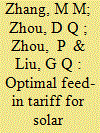| Srl | Item |
| 1 |
ID:
109334


|
|
|
|
|
| Publication |
2011.
|
| Summary/Abstract |
This paper examines the causal relationships between carbon dioxide emissions, energy consumption and real economic output using panel cointegration and panel vector error correction modeling techniques based on the panel data for 28 provinces in China over the period 1995-2007. Our empirical results show that CO2 emissions, energy consumption and economic growth have appeared to be cointegrated. Moreover, there exists bidirectional causality between CO2 emissions and energy consumption, and also between energy consumption and economic growth. It has also been found that energy consumption and economic growth are the long-run causes for CO2 emissions and CO2 emissions and economic growth are the long-run causes for energy consumption. The results indicate that China's CO2 emissions will not decrease in a long period of time and reducing CO2 emissions may handicap China's economic growth to some degree. Some policy implications of the empirical results have finally been proposed.
|
|
|
|
|
|
|
|
|
|
|
|
|
|
|
|
| 2 |
ID:
115643


|
|
|
|
|
| Publication |
2012.
|
| Summary/Abstract |
Global awareness on energy security and climate change has created much interest in assessing economy-wide energy efficiency performance. A number of previous studies have contributed to evaluate energy efficiency performance using different analytical techniques among which data envelopment analysis (DEA) has recently received increasing attention. Most of DEA-related energy efficiency studies do not consider undesirable outputs such as CO2 emissions in their modeling framework, which may lead to biased energy efficiency values. Within a joint production framework of desirable and undesirable outputs, in this paper we construct both static and dynamic energy efficiency performance indexes for measuring industrial energy efficiency performance by using several environmental DEA models with CO2 emissions. The dynamic energy efficiency performance indexes have further been decomposed into two contributing components. We finally apply the indexes proposed to assess the industrial energy efficiency performance of different provinces in China over time. Our empirical study shows that the energy efficiency improvement in China's industrial sector was mainly driven by technological improvement.
|
|
|
|
|
|
|
|
|
|
|
|
|
|
|
|
| 3 |
ID:
150059


|
|
|
|
|
| Summary/Abstract |
The feed-in tariff policy is widely used to promote the development of renewable energy. China also adopts feed-in tariff policy to attract greater investment in solar photovoltaic power generation. This study employs real options method to assess the optimal levels of feed-in tariffs in 30 provinces of China. The uncertainties in CO2 price and investment cost are considered. A method that integrates the backward dynamic programming algorithm and Least-Squares Monte Carlo method is used to solve the model. The results demonstrate that the feed-in tariffs of 30 provinces range from 0.68 RMB/kWh to 1.71 RMB/kWh, and the average level is 1.01 RMB/kWh. On this basis, we find that the levels of sub-regional feed-in tariff announced in 2013 are no longer appropriate and should be adjusted as soon as possible. We have also identified the implications of technological progress and carbon emission trading schemes, as well as the importance of strengthening electricity transmission. It has been suggested that the Chinese government takes diverse measures, including increasing research and development investment, establishing and improving a nationwide carbon emission trading scheme and accelerating the construction of electricity-transmission infrastructure, to reduce the required feed-in tariff and promote the development of solar photovoltaic power generation.
|
|
|
|
|
|
|
|
|
|
|
|
|
|
|
|